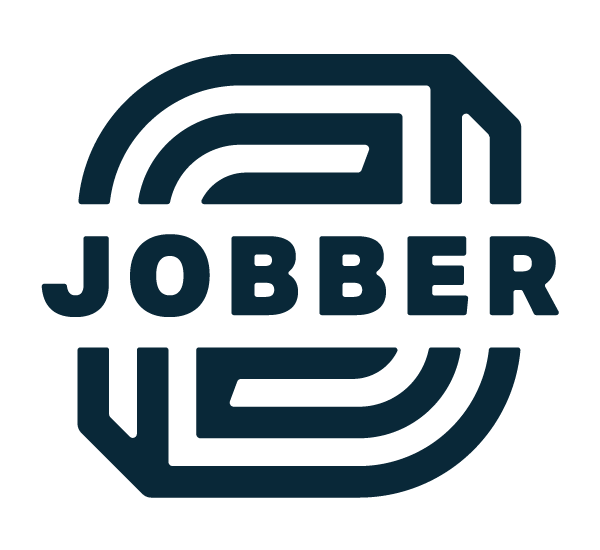
Jobber wasn’t around when I started using Service Autopilot to run my landscaping company 855rilawns. However, whether you are an HVAC, plumbing, landscaping, cleaning, or pressure washing contractor, Jobber is a great option for running your service company. Similar to Service Autopilot, Jobber is a CRM that can help you manage, simplify, and automate your business. If you are interested in learning about the difference between the two CRMs, you can read our Jobber versus Service Autopilot post here.
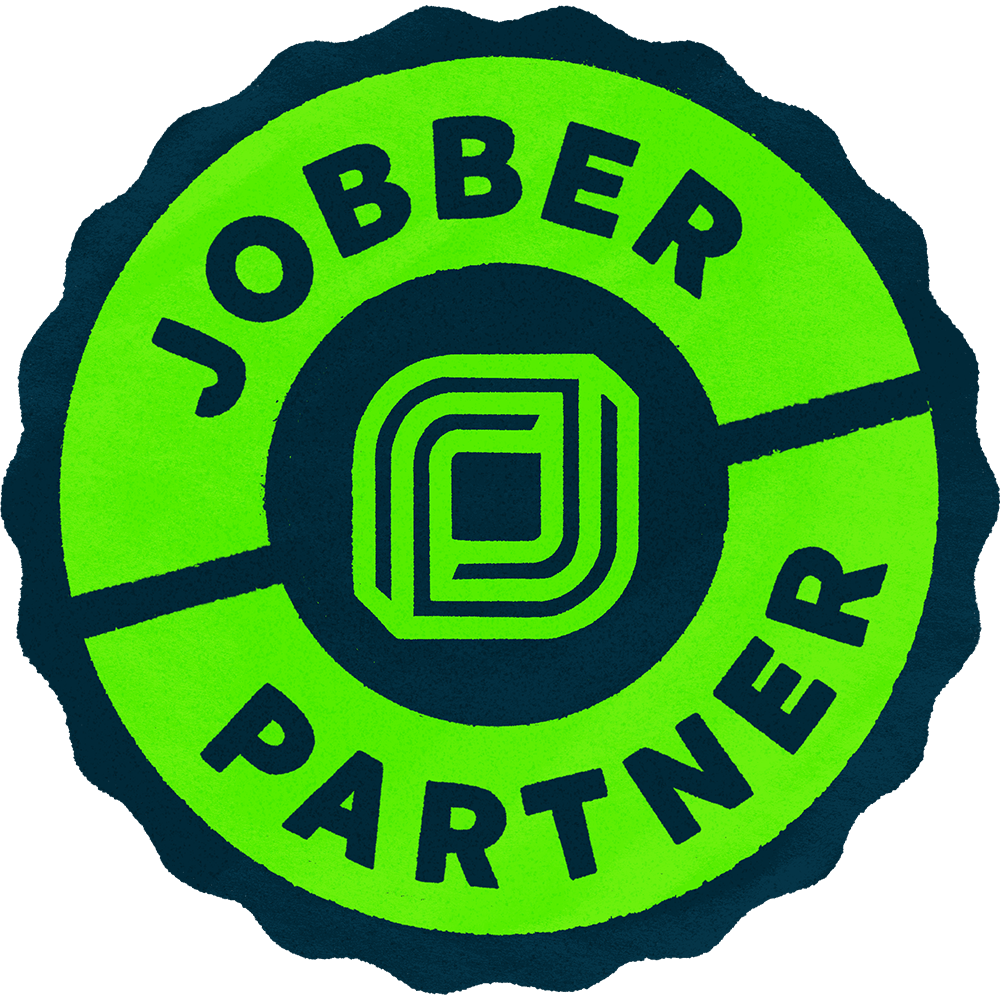
Jobber’s CRM screen offers all the contact information you would want about your customer. It also offers a Client Hub where clients can login to view their invoices, quotes, pay their bill, view appointments, and send in requests which sync with the backend if your Jobber CRM.
Another cool feature that is pretty common-place these days, is the ability to receive leads directly into your CRM. Before using a CRM for my landscaping company, I used to get leads in my email inbox and then copy and paste all that information into Quickbooks. What a waste of time! With Jobber, any leads that request information only have a form they can fill out in Facebook or through your website, which will carry those details straight over into your system. What’s more, is that these leads can then be sent right into Mailchimp for marketing through Jobber’s Zapier integration. More on this later.
Two way text messaging is also available, so when clients are texted their quotes or late invoice reminders through the notifications below, you can then respond to these messages. No more pulling out your phone and keeping track of messages in two different places!
Tags are also commonplace these days inside of service company CRM’s. Tags help you segregate your client and leads list, to better organize them and segregate them for things like marketing campaigns.

Jobber “notifications” is similar to “Automations” in Service Autopilot, except it is much more intuitive to use and also has simplified capabilities to go with it.
Within the settings, you can choose to send automatic communication to clients based on sent quotes, upcoming appointments, completed work, and unpaid invoices. You can automatically send one or two emails or text messages for each event occurrence. The message looks something like this, which can also be customized:
Hi {{CLIENT_NAME}},
{{VISIT_DETAILS}}
If you have any questions or concerns, please don’t hesitate to get in touch with us at {{DEFAULT_EMAIL}}.
CLICK LINK BELOW TO VIEW YOUR APPOINTMENT:
{{VISIT_CONFIRMATION_LINK}}
Sincerely,
{{COMPANY_NAME}}

In Jobber, you can easily schedule requests (aka estimates) or jobs. These jobs are visible on the Jobber mobile app for the crews to complete, which can then have forms pop-up, such as cleaning checklists or inspection forms which are saved to the client’s accounts.
With the mobile app, crews are able to see the jobs that you dispatch to them right on their device. As they complete the jobs, the customer is invoiced. The app also works with the GPS tracking feature which is nice, as you can see where an employee is when they clock into a job. Jobber uses their own GPS tracking integration, but you can always use Bouncie GPS tracking, instead.
Jobber also has a routing feature, so that once you have your schedule set for the day, the jobs will be automatically put into driving order. This is obviously an essential feature these days, and it is nice that this happens on the back-end without any manual steps required from the job scheduler.
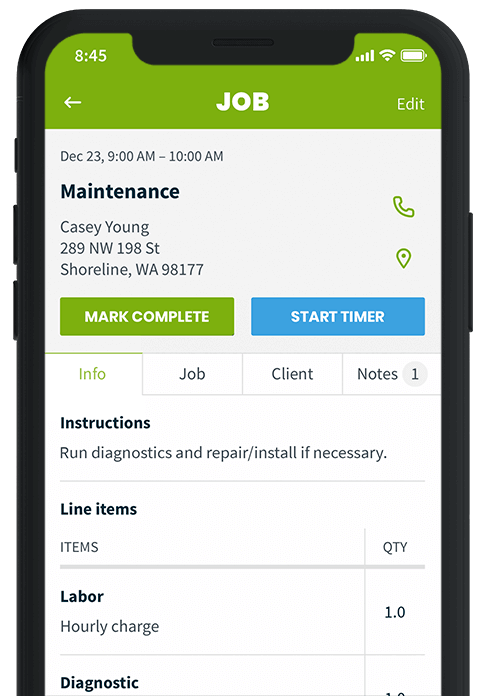
Most CRM’s these days come close to eliminating double entry. By double entry, I mean these days you shouldn’t have to copy and paste a lead from your email, then write a quote, then copy and paste the job for the crews, then manually create the invoice afterwards. This is just silliness and super early 2000s.
These days, with CRMs such as Jobber, this is one seamless process. As you can see in the top right corner of the image below, a lead comes in, is converted to a quote, is converted to a job, and finally to an invoice. Anything you type on the quote transcribes directly to the crew which carries directly over to the invoice once the job is completed. Easy peasy!
Quotes are very easy to prepare in Jobber and upon sign up, they come with pre-built services. You can easily modify the price and details for your crews and for the invoices. Once you are done, if you are signed up for credit card processing, you can charge the credit or debit card and instantly have the funds in your account as soon as the next day.
Within the quote and on the service level, you have the ability to apply markups to each service. For example, you can put in your cost of labor is $20 per hour, with a 100% markup, and Jobber will display the anticipated margin on the quote. You also have the ability to add expenses to quotes. However, this is as in-depth as the job costing goes. There is no way to job cost and see how long you performed on the job versus what was estimated, as you can do with other CRMS such as LMN and Service Autopilot.
The invoices can be paid via Jobber’s built-in credit card processing called Jobber Payments, which is priced at a competitive rate based on your subscription level.
Like Service Autopilot, the cards can be saved on file and automatically charged when an invoice is created. This is a completely automated process with Jobber, but by design requires some manual approval through Service Autopilot. To be honest, I am not sure if this is a bad or good thing. If something is not correct on the invoice, it can be a big issue. Giving a computer full autonomy to charge credit cards may not be the best idea!

Jobber has a client hub which gives clients most of the information they would want to know. This includes being able to view and pay their invoices, send in new requests, view past quotes, and upcoming appointments and services.
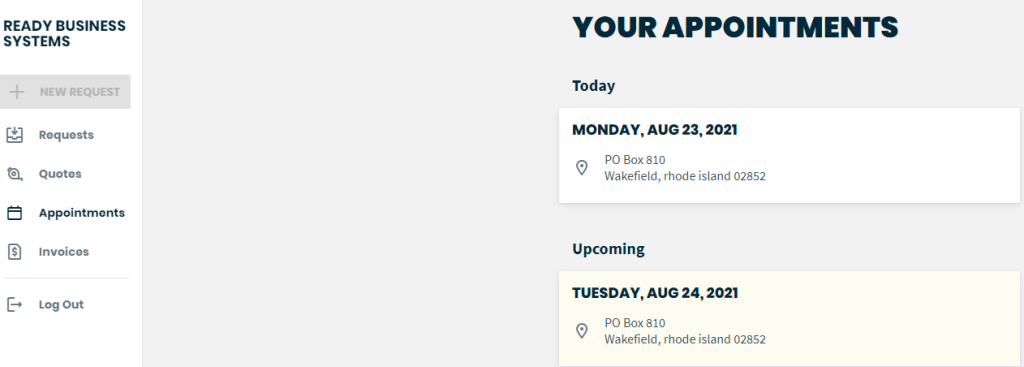
Jobber offers a plethora of reports. This is common in today’s CRMS. They will collaborate all the data in their system and display it for you in organized reports. Once inside of each report, you can filter them by dates and even create projections.
Look at the reports this way- each client has invoices, jobs scheduled, communication sent and received, and tons of other information. This is easy to view inside an individual client’s account, but what if you want to see ALL the open invoices for ALL your clients, or ALL the jobs scheduled, or ALL the communication? This is where the report center comes in handy.
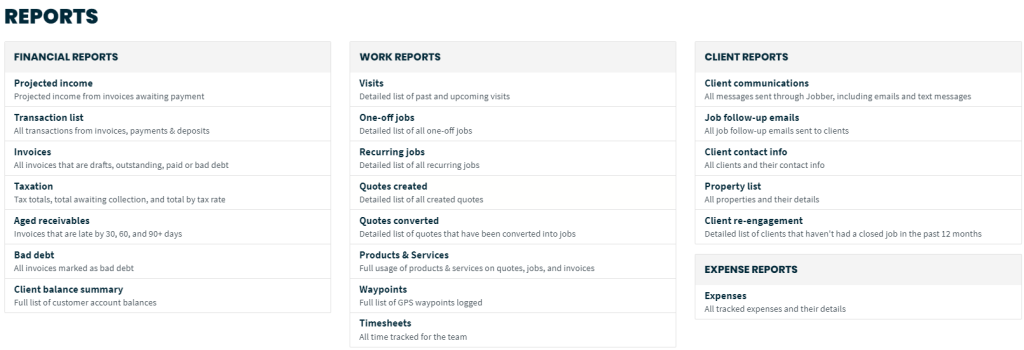
This is one of the coolest parts of Jobber in my opinion. The automation aspect of any software is the most valuable part of using software in your business!
Jobber calls their third party integrations their App marketplace.
Similar to Service Autopilot, Jobber also offers integration with SendJim for marketing such as postcards, automated voicemails, and mailing gifts. However, their integration is more limited in that you can only send marketing material based on the trigger of an invoice being paid or a job being scheduled.
However, because Jobber allows third party apps, it opens a huge network of developers. Jobber directly connects with essential apps such as Google Ads, Mailchimp, Quickbooks, and Jobber Payments.
Zapier is a third party integration that additionally connects with 1500+ other apps, which opens the window to virtually limitless possibilities. Popular apps such as Slack, Facebook ads, and Google Calendar can be synced with Jobber to supercharge and automate your business.

Ready to try Jobber?
Click here to get a two week trial and 30% off for the first 3 months through Ready Business Systems!
If you are curious how much Jobber costs, this is a great question. Like other CRM software, Jobber offers several different levels of subscriptions- Core, Connect, and Grow.
All plans offer the basic CRM, Client Hub, Scheduling, Quotes, and Invoicing, but things like online bookings, text messaging, notifications, Quickbooks Sync, 3rd party integrations, routing, GPS tracking, or more than one user, you are going to have to pay extra.
The higher the tier you choose, the lower the rates they charge you for credit card processing. The have the most powerful features such as quote follow ups, two way texting, and mailchimp integration, you are going to need the Grow plan at $199/month or $279/year as of 2021.
The cost here is comparable to other CRMs with the same features. However, keep in mind that if you intend to integrate services such as Mailchimp or SendJim you are going to have to pay for those separate services, as well. For example, for a premium subscription to mailchimp you will have to pay $299/month.

Jobber is a great CRM option. Everything seems to work smoothly, when compared to Service Autopilot. There is less to customize, which means things are generally easier to use out of the box and work better.
However, with its simplicity comes the drawback that it is a little less powerful in some aspects and it may be harder to accomplish specific tasks. For example, there is no way to bulk-schedule jobs for multiple clients, it has to be done one by one. Today, I bulk scheduled property inspections in Service Autopilot for all of our clients with a few clicks, but this would not be possible with Jobber.
A major thing that Jobber is lacking is a job costing feature, which is a built-in solution to ensure your company is profitable as a whole and on each job. You do have the ability to see your forecasted margins on each estimate, but you cannot see how this compares to the actual production side of things. This creates a disconnect between the sales and production parts of the business. Additionally, the crew is left in the dark with the lack of a budget hours feature, which communicates with the crew how much time is allocated to complete each job. Jobber does have expense and time tracking capabilities, so it would be great if they could bring all this together to offer reports on job costing.
In comparision, LMN does budgeting and job costing great, but they lack all the communication and automation features that Service Autopilot and Jobber have. So it depends which features are more important to you.
In conclusion, Jobber is a solid software solution to use as a hub to run your service business. Its apps give Jobber powerful automation and connectivity, that services such as Service Autopilot and LMN do not offer. Service Autopilot offers similar automation, which is mostly handled in-house, whereas through the open source APIs available in the Jobber App Marketplace, Jobber opens up a much bigger world.
At first glance Jobber may look cheaper than other solutions. However, many of the Apps come with their own monthly charges. For example Responsibid, one of the most popular Apps for Jobber, runs $169/month and Mailchimp can cost up to $299/month.
At the end of the day, no CRM software out there actually handles EVERYTHING you need, which is why Ready Business Systems brings together the missing pieces with other software solutions for your business needs.
Here at Ready Business Systems, we have experience working with many different CRMs including Service Autopilot, LMN, Jobber and Real Green. Not only do we have experience using different software, but we use it daily in our businesses! The major value we provide here, is we can talk to you business owner-to-business owner and send you in the right direction for your business. Please contact us or browse through our site for more information.
Ready to try Jobber?
Click here to get a two week trial and 30% off for the first 3 months through Ready Business Systems!